p-Hydroxymandelic acid
Modify Date: 2025-08-26 09:35:41
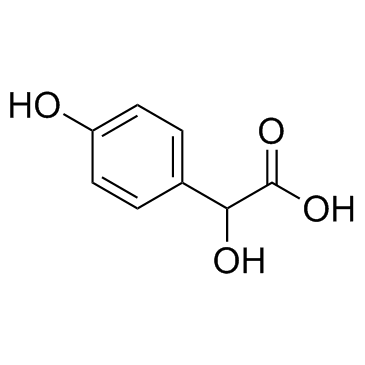
p-Hydroxymandelic acid structure
|
Common Name | p-Hydroxymandelic acid | ||
|---|---|---|---|---|
| CAS Number | 1198-84-1 | Molecular Weight | 168.14700 | |
| Density | 1.48 g/cm3 | Boiling Point | 405.4ºC at 760 mmHg | |
| Molecular Formula | C8H8O4 | Melting Point | 82-85 °C(lit.) | |
| MSDS | N/A | Flash Point | 213.1ºC | |
Use of p-Hydroxymandelic acidp-Hydroxymandelic acid is a valuable aromatic fine chemical and widely used for production of pharmaceuticals and food additives. |
| Name | 4-hydroxymandelic acid |
|---|---|
| Synonym | More Synonyms |
| Description | p-Hydroxymandelic acid is a valuable aromatic fine chemical and widely used for production of pharmaceuticals and food additives. |
|---|---|
| Related Catalog | |
| Target |
Human Endogenous Metabolite |
| In Vitro | p-Hydroxymandelic acid (4-Hydroxymandelic acid; 4-HMA) is widely used in production of aromatic drugs and flavors. It is employed for the preparation of 4-hydroxyphenylacetic acid, which is the synthetic precursor of selective β1-receptor antagonist drug atenolol. p-Hydroxymandelic acid can conjugate cytotoxic drug and enzyme substrate, and such a p-Hydroxymandelic acid based adaptor system showed promising application in the targeting drug delivery system[1]. |
| References |
| Density | 1.48 g/cm3 |
|---|---|
| Boiling Point | 405.4ºC at 760 mmHg |
| Melting Point | 82-85 °C(lit.) |
| Molecular Formula | C8H8O4 |
| Molecular Weight | 168.14700 |
| Flash Point | 213.1ºC |
| Exact Mass | 168.04200 |
| PSA | 77.76000 |
| LogP | 0.51020 |
| Storage condition | -20°C |
Synonym:alpha,4-Dihydroxybenzeneacetic acid; DL-4-Hydroxymandelic acid; DL-p-Hydroxymandelic acid; p-Hydroxyphenylglycolic acid Section 2 - COMPOSITION, INFORMATION ON INGREDIENTS
Risk Phrases: None Listed. Section 3 - HAZARDS IDENTIFICATION EMERGENCY OVERVIEW
Not available. Potential Health Effects Eye: May cause eye irritation. Skin: May cause skin irritation. Ingestion: May cause irritation of the digestive tract. The toxicological properties of this substance have not been fully investigated. Inhalation: May cause respiratory tract irritation. The toxicological properties of this substance have not been fully investigated. Chronic: No information found. Section 4 - FIRST AID MEASURES Eyes: Flush eyes with plenty of water for at least 15 minutes, occasionally lifting the upper and lower eyelids. Get medical aid. Skin: Get medical aid. Flush skin with plenty of water for at least 15 minutes while removing contaminated clothing and shoes. Wash clothing before reuse. Ingestion: Never give anything by mouth to an unconscious person. Get medical aid. Do NOT induce vomiting. If conscious and alert, rinse mouth and drink 2-4 cupfuls of milk or water. Inhalation: Remove from exposure and move to fresh air immediately. If not breathing, give artificial respiration. If breathing is difficult, give oxygen. Get medical aid. Notes to Physician: Section 5 - FIRE FIGHTING MEASURES General Information: As in any fire, wear a self-contained breathing apparatus in pressure-demand, MSHA/NIOSH (approved or equivalent), and full protective gear. During a fire, irritating and highly toxic gases may be generated by thermal decomposition or combustion. Extinguishing Media: Use water spray, dry chemical, carbon dioxide, or appropriate foam. Section 6 - ACCIDENTAL RELEASE MEASURES General Information: Use proper personal protective equipment as indicated in Section 8. Spills/Leaks: Vacuum or sweep up material and place into a suitable disposal container. Clean up spills immediately, observing precautions in the Protective Equipment section. Avoid generating dusty conditions. Provide ventilation. Section 7 - HANDLING and STORAGE Handling: Wash thoroughly after handling. Remove contaminated clothing and wash before reuse. Use with adequate ventilation. Minimize dust generation and accumulation. Avoid contact with eyes, skin, and clothing. Keep container tightly closed. Avoid breathing dust. Storage: Store in a tightly closed container. Store in a cool, dry, well-ventilated area away from incompatible substances. Store protected from light. Section 8 - EXPOSURE CONTROLS, PERSONAL PROTECTION Engineering Controls: Facilities storing or utilizing this material should be equipped with an eyewash facility and a safety shower. Use adequate ventilation to keep airborne concentrations low. Exposure Limits CAS# 1198-84-1: CAS# 7198-10-9: Personal Protective Equipment Eyes: Wear appropriate protective eyeglasses or chemical safety goggles as described by OSHA's eye and face protection regulations in 29 CFR 1910.133 or European Standard EN166. Skin: Wear appropriate protective gloves to prevent skin exposure. Clothing: Wear appropriate protective clothing to prevent skin exposure. Respirators: A respiratory protection program that meets OSHA's 29 CFR 1910.134 and ANSI Z88.2 requirements or European Standard EN 149 must be followed whenever workplace conditions warrant respirator use. Section 9 - PHYSICAL AND CHEMICAL PROPERTIES Physical State: Crystalline powder Color: off-white Odor: none reported pH: Not available. Vapor Pressure: Not available. Viscosity: Not available. Boiling Point: Not available. Freezing/Melting Point: 103-106 deg C Autoignition Temperature: Not applicable. Flash Point: Not applicable. Explosion Limits, lower: Not available. Explosion Limits, upper: Not available. Decomposition Temperature: Solubility in water: Specific Gravity/Density: Molecular Formula: C8H8O4 Molecular Weight: 168.15 Section 10 - STABILITY AND REACTIVITY Chemical Stability: Stable under normal temperatures and pressures. Darkens and decomposes on exposure to light. Conditions to Avoid: Dust generation, excess heat, excess light. Incompatibilities with Other Materials: Strong oxidizing agents. Hazardous Decomposition Products: Carbon monoxide, irritating and toxic fumes and gases, carbon dioxide. Hazardous Polymerization: Has not been reported Section 11 - TOXICOLOGICAL INFORMATION RTECS#: CAS# 1198-84-1 unlisted. CAS# 7198-10-9 unlisted. LD50/LC50: Not available. Not available. Carcinogenicity: 4-Hydroxyphenylglycolic acid - Not listed by ACGIH, IARC, or NTP. Deleted Registry Number - Not listed by ACGIH, IARC, or NTP. Section 12 - ECOLOGICAL INFORMATION Section 13 - DISPOSAL CONSIDERATIONS Dispose of in a manner consistent with federal, state, and local regulations. Section 14 - TRANSPORT INFORMATION IATA Not regulated as a hazardous material. IMO Not regulated as a hazardous material. RID/ADR Not regulated as a hazardous material. Section 15 - REGULATORY INFORMATION European/International Regulations European Labeling in Accordance with EC Directives Hazard Symbols: Not available. Risk Phrases: Safety Phrases: S 24/25 Avoid contact with skin and eyes. WGK (Water Danger/Protection) CAS# 1198-84-1: No information available. CAS# 7198-10-9: No information available. Canada None of the chemicals in this product are listed on the DSL/NDSL list. CAS# 1198-84-1 is not listed on Canada's Ingredient Disclosure List. CAS# 7198-10-9 is not listed on Canada's Ingredient Disclosure List. US FEDERAL TSCA CAS# 1198-84-1 is not listed on the TSCA inventory. It is for research and development use only. CAS# 7198-10-9 is not listed on the TSCA inventory. It is for research and development use only. SECTION 16 - ADDITIONAL INFORMATION N/A |
| Hazard Codes | Xi: Irritant; |
|---|---|
| Risk Phrases | R36/37/38 |
| Safety Phrases | S26-S36 |
| WGK Germany | 3 |
| HS Code | 2918290000 |
| Precursor 10 | |
|---|---|
| DownStream 9 | |
| HS Code | 2918290000 |
|---|---|
| Summary | HS: 2918290000 other carboxylic acids with phenol function but without other oxygen function, their anhydrides, halides, peroxides, peroxyacids and their derivatives Tax rebate rate:9.0% Supervision conditions:AB(certificate of inspection for goods inward,certificate of inspection for goods outward) VAT:17.0% MFN tariff:6.5% General tariff:30.0% |
| EINECS 214-839-7 |
| 4-Hydroxyphenylglycolic Acid |
| P-Hydroxy Mandelic Acid |
| 2-Hydroxy-2-(4-hydroxyphenyl)acetic acid |
| MFCD00004234 |
 CAS#:298-12-4
CAS#:298-12-4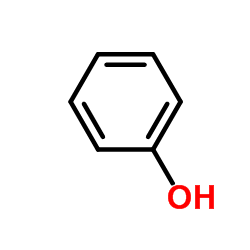 CAS#:108-95-2
CAS#:108-95-2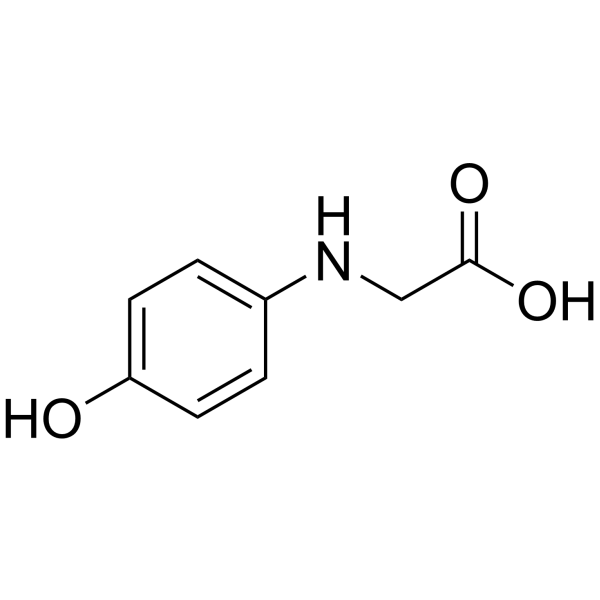 CAS#:122-87-2
CAS#:122-87-2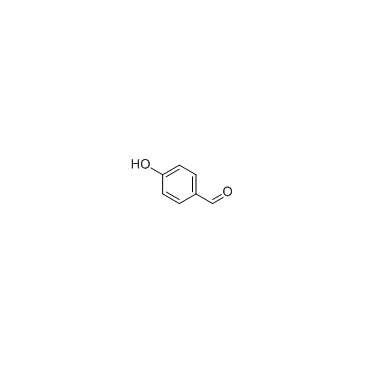 CAS#:123-08-0
CAS#:123-08-0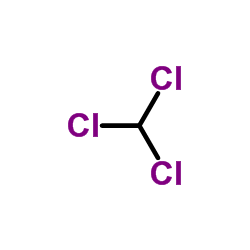 CAS#:67-66-3
CAS#:67-66-3 CAS#:68758-68-9
CAS#:68758-68-9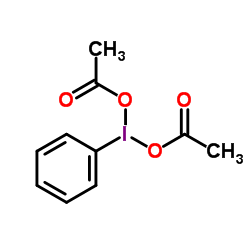 CAS#:3240-34-4
CAS#:3240-34-4 CAS#:14199-15-6
CAS#:14199-15-6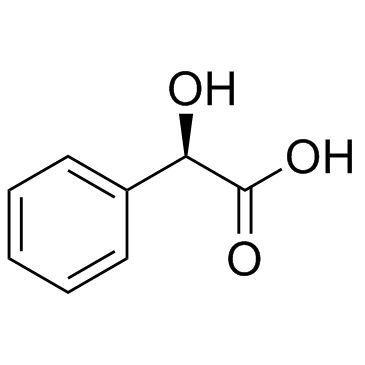 CAS#:611-71-2
CAS#:611-71-2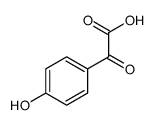 CAS#:15573-67-8
CAS#:15573-67-8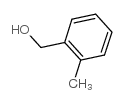 CAS#:89-95-2
CAS#:89-95-2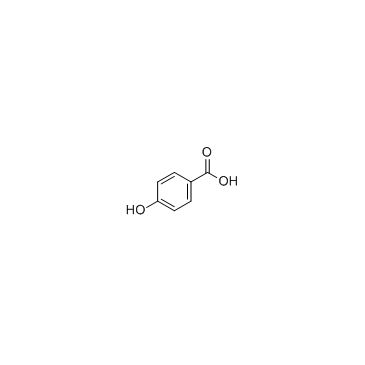 CAS#:99-96-7
CAS#:99-96-7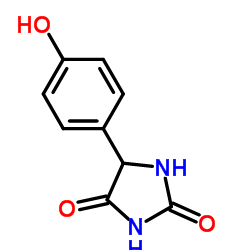 CAS#:2420-17-9
CAS#:2420-17-9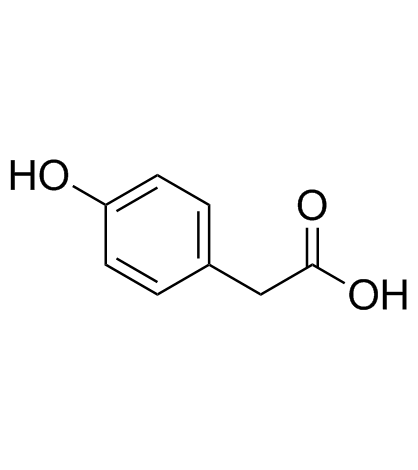 CAS#:156-38-7
CAS#:156-38-7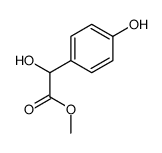 CAS#:68758-69-0
CAS#:68758-69-0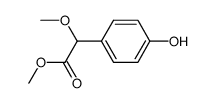 CAS#:76529-98-1
CAS#:76529-98-1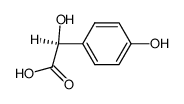 CAS#:13244-75-2
CAS#:13244-75-2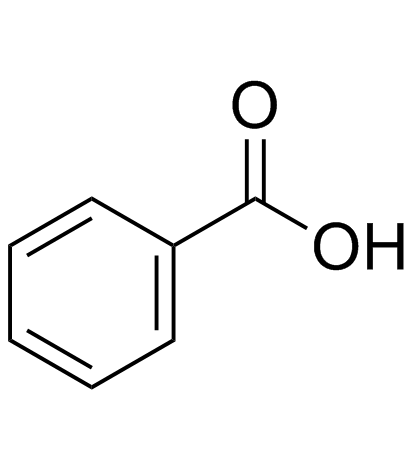 CAS#:65-85-0
CAS#:65-85-0
